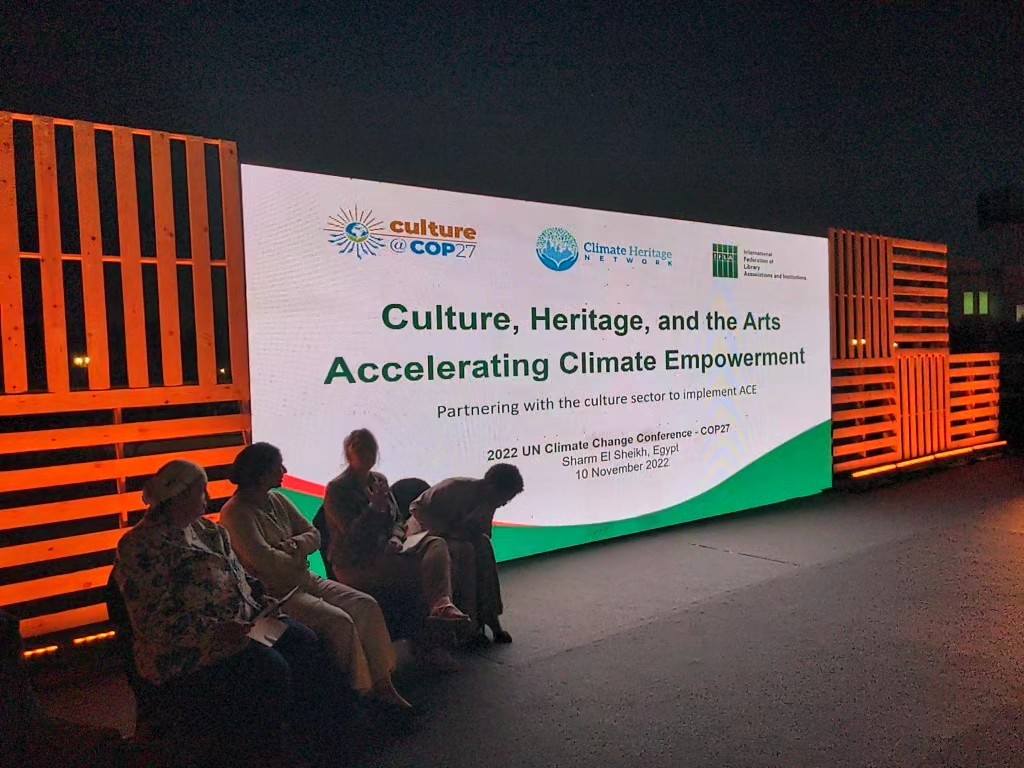The 2022 UN Climate Change Conference (COP27): Outcomes and opportunities for libraries
20 abril 2024
From 6-20 November 2022, 35,000 delegates from 190 countries, including more than 90 heads of state, came together in Sharm El Sheikh, Egypt, for the 2022 UN Climate Change Conference – COP27.

Thanks to our participation in the Climate Heritage Network, IFLA was excited to bring a small delegation to Sharm El Sheikh to take part in the first week of COP27. This offered opportunities to bring library perspectives into the discussion and explore possibilities for the library field to engage in climate action even further.
Key Outcomes
The goal of COP27 was to focus on action and implementation, which is reflected in the key output document, the Sharm el-Sheikh Implementation Plan.
In reality, much more was achieved regarding the impacts of climate change rather than targeting its causes, with little done to advance efforts to keep warming below 1.5°C. However, there was significant progress made on adaptation, with commitments from state parties to help improve resilience among the world’s most vulnerable populations.
Perhaps the most significant outcome of COP27 is a landmark decision to set up a new fund for “loss and damage”, which is the result of a decade of advocacy led by vulnerable nations. This fund is intended to support those nations who are experiencing the most immediate and devastating affects of climate-related disasters.
Culture in Climate Action
In an outcome that is being applauded by Climate Heritage Network, cultural heritage was included in several key COP27 decisions. The inclusion of cultural heritage in statements on both loss and damage and adaptation signals that the links between culture and climate change are increasingly being recognised by parties to the UN Climate Convention. Specific outcomes include:
- The Sustainable Urban Resilience for the next Generation (SURGe) Initiative: launched during COP27, this initiative identifies culture and heritage as resources which strengthen the ability of communities to transform equitably and sustainably. Read more on this programme.
- Parties suggest “tangible cultural heritage” be considered as a theme in a new framework based on the Glasgow-Sharm el-Sheikh work programme on the global goal on adaptation, which will be developed further in the coming year.
Read more on culture at COP27: Climate Heritage Network lauds landmark Culture Outcomes at COP27; Redoubles Efforts to Win More Holistic Recognition
Climate Empowerment
The Subsidiary Body for Implementation has approved a 4-year action plan to advance implementation of the Glasgow Work Programme on Action for Climate Empowerment. The Glasgow Work Programme was launched in 2021 and calls on countries to increase their commitment to climate-related education, training, public awareness, public participation, public access to information, and international cooperation. Find out what this can mean for libraries.
COP27 increased momentum by launching this short-term, clear, and time-bound action plan, which reinforces climate empowerment as being fundamental to the achievement of climate action.
For the first time, this action plan takes an explicitly rights-based approach, calling on parties to swiftly being implementing ACE, “respecting, promoting and considering their respective obligations on human rights”. This means an even more solid ground by which to connect fundamental human rights and freedoms, including rights to information, culture, and freedom of expression, to climate action.
What does this mean for libraries?
The increased presence of culture in climate action offers a stronger basis by which cultural institutions, such as libraries, can be recognised for their contribution to climate action.
Look to the SURGe Initiative for an example, which views cites as engines of climate action and innovators of resilience-building. Library advocacy can be strengthened by highlighting the role of libraries in building resilience at a community level. Libraries may be well-placed to cooperate with local government on initiatives that accelerate local and urban climate action.
Libraries and the ACE Action Plan
The ACE Action Plan increases possibilities for libraries to amplify their contribution to local and national strategies for climate education, training, public awareness, public participation, public access to information, and international cooperation. For more on this topic, look to IFLA’s Pledge for Climate Empowerment, and consider adding your voice!
Below are a selection of activities named in the Action Plan, along with ideas for how libraries might get involved.
Activities:
1. Strengthening integration of ACE into the development and implementation of national climate policies, plans, strategies and action
- Libraries can identify and share good practices of libraries contributing to national climate policies, plans, strategies and actions
2. Promote local and regional networks and platforms, and enhance regional cooperation through virtual and in-person regional dialogues, workshops and consultations
- Libraries can:
- Initiate or participate in local climate empowerment networks
- Initiate regional dialogues, workshops, and consultations on climate empowerment
3. Meaningfully engage youth, women, indigenous peoples and persons with disabilities in climate action.
- Libraries can target these groups in their climate programmes, with a focus on strengthening their role in decision-making and implementing climate action
4. Strengthen monitoring, evaluation, and reporting
- Libraries can:
- Document and report on their impact at the local, regional, and international levels
- Submit an SDG-story on climate empowerment
- Organise workshops and other peer-to-peer learning activities to share ideas for implementing and measuring climate empowerment
5. Build the capacity and skills of ACE focal points.
The person or agency in charge of implementing and monitoring ACE implementation at the national level is the national ACE Focal Point.
Relevant to all these activities, libraries and library associations are encouraged to contact their national ACE Focal Point to share examples of how their library or library association is implementing climate empowerment, and discuss how they might contribute further to local and/or national climate policies, plans, strategies and actions.
Subscribe to the Action for Climate Empowerment Newsletter to stay up to date with news, opportunities, events, and knowledge products related to climate empowerment: subscribe here.
Stay tuned for more stories from IFLA’s participation at COP27 coming soon.
Contact: claire.mcguire@ifla.org